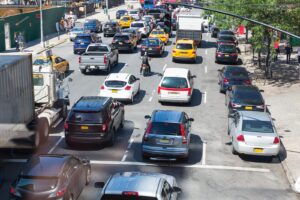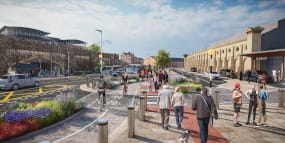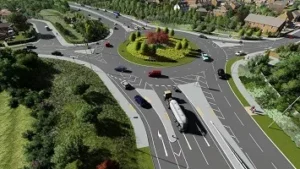York has been announced as one of only 10 cities on the shortlist for the $9-million Toyota Mobility Foundation Sustainable Cities Challenge, one of only two in Europe and the only UK city.
The Toyota Mobility Foundation, in partnership with Challenge Works and World Resources Institute, launched the Challenge in June 2023. The global mobility challenge helps cities prepare for the future and will support innovation with the potential to transform the lives of millions of people around the world.
York wants to find new innovative solutions to turn its existing fragmented ‘fleets’ of public transportation, shared transportation, and private vehicles into a more cohesive virtual fleet to enable better urban management of total vehicle movements for people and goods.
Transport is almost a third of York’s total emissions, negatively impacting health, wellbeing, and the city’s architectural heritage. A 2030 Net Zero target recognises the need to cut vehicle miles by 20% and to shrink the impact of each journey is critical. York’s Challenge would seek to empower sustainable mode choices while increasing the affordability of passenger and goods movements
While the current focus for York’s entry is cohesive virtual fleets if they’re successful, the city team will explore this issue and other mobility issues with local stakeholders to identify how they can best support mobility systems. Open innovation Challenges often develop and evolve throughout the process as the city’s specific needs are understood more closely.
Councillor Pete Kilbane, City of York Council’s Deputy Leader and Executive Member for Economy & Transport said: “Our Council Plan, ‘One City for all’ makes very clear that our focus on our core commitments – creating equal opportunity, finding innovative ways to make the city more affordable, tackling climate change, and improving health and wellbeing – means preparing for the future, adapting our city to extreme climate events and enhancing our environment for future generations as well as delivering sustainable, accessible transport for all.
“The city centre challenges of York’s mediaeval street pattern means that getting transport right for everybody requires significant care, careful consultation and ambitious innovation to make sure we assign limited shared space efficiently, dynamically, and sustainably.
It is a significant credit to York that we have been included in this global list of world-leading cities. This Challenge will help us to get the innovation needed to achieve a better balance between people and goods across a range of competing mobility needs and vehicle types, improving mobility for the people and businesses of York.
“This is a major boost as we embark on the very significant and broad Our Big Transport Conversation consultation we are carrying out from later this month, as part of our commitment to reducing vehicle miles by 20% and delivering a transport infrastructure here in York”
Cities were invited to enter the Challenge by identifying areas in which innovation would help them expand access to safe, affordable, and inclusive modes of transportation; harness the power of data to create connected and resilient mobility ecosystems; and reduce environmental impact through low-carbon and renewable solutions.
Michael Howard, City of York Council’s Head of Highways and Transport added, “Resolving transport is not only a city challenge, but also a regional and global one as people’s movement often impacts more than just one place and that signals a need for initiatives that support collaboration and innovation at a global scale.
“York’s ageing population is experiencing greater need for personalized mobility services while at the same time, an affordability crisis is undermining accessibility, and COVID-19 has changed commuting patterns. A growing understanding of the need for enabling transport provision for women and people with disabilities, requires a reconfiguring of urban transport.
“York also receives almost 20 times per capita more visitors than London, adding significant demand when transport (mostly from road transport) is already almost a third of York’s total emissions, negatively impacting health, wellbeing, and the city’s architectural heritage. The 2030 Carbon Net Zero target recognizes the need to shrink the impact of each journey. York’s solutions need to empower sustainable mode choices while increasing affordability of passenger and goods movements.”
Over 200 entries were received during this entry period from over 150 cities in 46 countries globally. They were assessed on the impact the Challenge would have, the receptiveness of the issue to open innovation approaches, capacity within the city, and the focus of the entry. The shortlist includes cities in Brazil, Colombia, India, Italy, Malaysia, Mexico, the United Kingdom, and the United States.
York will be invited to attend a capacity building academy and will receive support developing their challenge design, becoming part of a wider network of other innovative city teams.
Three cities from the shortlist will be selected to launch their own City Challenges and in mid 2024, the call will be launched to global innovators to work with the winning cities. Innovators could be homegrown – living in the city or country chosen – or may be from anywhere across the globe, but with solutions applicable and tailored to the winning cities.
City Challenges will identify and support innovators through a 2-year challenge with up to $9 million available to innovators and cities to support the growth and scaling of solutions.
Ryan Klem, Director of Programs at the Toyota Mobility Foundation, said: “This shortlist shows how cities of all sizes around the world face a wide variety of mobility challenges. We can see how these cities are already making efforts to improve their transportation systems and we are very excited to begin supporting them directly in the next stage of the Sustainable Cities Challenge.”
Kathy Nothstine, Head of Future Cities at Challenge Works, said: “These cities have highlighted different areas where innovation has the potential to make mobility systems more sustainable, resilient and accessible. The Sustainable Cities Challenge will bring cities and innovators together with city residents to tailor solutions to real world challenges through open innovation.”
Ben Welle, Director of Integrated Transport and Innovation at WRI Ross Center for Sustainable Cities, said: “By making transport systems safer, more sustainable and affordable, cities can improve access to jobs and education, and improve people’s health. The Sustainable Cities Challenge will help to improve the quality of life for people living in cities all over the world.”
The Sustainable Cities Challenge is funded by the Toyota Mobility Foundation and has been designed in partnership with Challenge Works and World Resources Institute. Challenge Works is an international leader in developing challenge programs to drive new thinking and find creative solutions to problems facing society. World Resources Institute is a global research organisation which works with partners to develop practical solutions that improve people’s lives and ensure that nature can thrive.
























